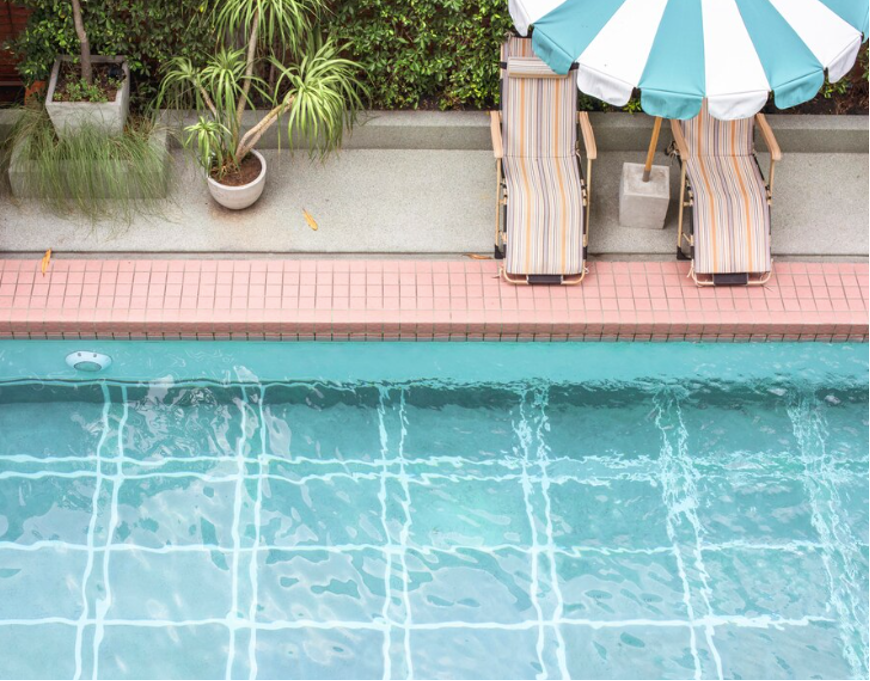The liner of a pool not only defines its aesthetics, but also influences its durability and the efforts required for its maintenance. If you are thinking of installing a pool at home or renovating the one you already have, it is essential to choose the right pool liner to achieve the perfect balance between beauty and functionality. In this article, we will give you some notions about the different types of liner materials, their advantages, disadvantages and maintenance tips.
Types of swimming pool liner materials
1. Gresite
Gresite is one of the most popular materials due to its durability and versatility in design. It is composed of small pieces of vitrified glass that are assembled into mosaics, allowing for a wide range of colors and patterns.
Advantages:
- High durability
- Wide variety of designs and colors
- Chemical and wear resistance
Disadvantages:
- More costly and labor-intensive installation
- Need for regular maintenance to prevent algae accumulation in joints
When to use itIdeal for designer pools looking for a personalized touch with unique patterns and vibrant colors.
MAINTENANCERegular cleaning of the joints to prevent algae accumulation. The use of specific brushes and pH neutral cleaners is recommended.
2. Tile
Ceramic tile is another common option that offers a modern aesthetic and can be more economical than stoneware.
Advantages:
- Wide variety of colors and styles
- Relatively inexpensive
- Easy to clean
Disadvantages:
- May fade over time due to sun and water exposure
- Less durable than gresite
When to use itPerfect for those looking for an affordable, easy-to-install option with a modern look.
MAINTENANCEUse of mild cleaners to prevent discoloration and periodically check joints to prevent leaks.
3. Armored Plate
The reinforced sheet is a plasticized PVC membrane known for its waterproofing capacity and elasticity.
Advantages:
- Excellent waterproofing
- High resistance to expansion and chemicals
- Variety of designs
Disadvantages:
- Needs to be installed by professionals
- May be more expensive compared to other options
When to use itIdeal for pools that require robust waterproofing, especially in areas with adverse weather conditions.
MAINTENANCERegular inspection to detect possible tears or damage. Cleaning with specific products for PVC.
4. Wooden Decking
Wooden decking is an elegant and natural option for lining the edges of the pool, providing a warm and cozy atmosphere.
Advantages:
- Natural appearance and warm aesthetics
- Available in various designs and colors
- Relatively easy installation
Disadvantages:
- Increased maintenance required
- Susceptible to water and weather damage if not treated properly
When to use itIdeal for pools with a focus on natural design and when a cozy and elegant atmosphere is desired.
MAINTENANCERegular application of waterproofing treatments and protection against insects and fungi.
5. Stainless Steel
Advantages:
Stainless steel is a modern and resistant material, ideal for a minimalist and industrial design.
- Non-porous, reduces the risk of cracking
- Bacteria resistant due to the absence of seals
- Durable and long service life
Disadvantages:
- High initial investment
- Requires specific maintenance to avoid corrosion
When to use itPerfect for pools with a modern, industrial design, where durability and hygiene are priorities.
MAINTENANCERegular cleaning with specific products for stainless steel to prevent corrosion and maintain its shine.
6. Special Paints
Open pore paints are an economical option for pool resurfacing, allowing the concrete to breathe.
Advantages:
- More affordable option
- Easy to apply
Disadvantages:
- Reduced waterproofing
- Need for periodic repainting
When to use itSuitable for pools with a limited budget and where waterproofing is not a major concern.
MAINTENANCERegular repainting and control of the paint condition to ensure that no cracks are formed.
7. Sand
The resin-mixed sand liner offers a natural beach feel to your pool.
Advantages:
- Realistic beach feeling
- Unique and attractive aesthetics
Disadvantages:
- Not suitable for concrete pools
- Specific maintenance required
When to use itIdeal for pools looking for a beach themed design and a relaxed and natural atmosphere.
MAINTENANCEPeriodic cleaning and revision of the sand and resin layer to maintain its integrity and appearance.
8. PVC Liners or Sheets
PVC sheets are highly recommended for pools with cracks or leaks, offering an economical and durable solution.
Advantages:
- Economical and easy to install
- Long durability
- Variety of designs and colors
Disadvantages:
- Requires professional installation
- May increase the cost due to labor
When to use itPerfect for pools with waterproofing problems or that need a quick and effective renovation.
MAINTENANCERegular inspection for damage and cleaning with non-abrasive products.
Easy Pool: Your ally for impeccable maintenance, regardless of the material of your pool.
Choosing the right liner material for your pool depends on several factors, including budget, desired aesthetics and maintenance needs. Each material has its advantages and disadvantages, so it is crucial to consider all of these aspects before making a decision.
Our experience in maintenance allows us to perfectly understand the needs of each pool.regardless of its construction material. We know how to care for and prolong the useful life of each type of surface, guaranteeing clean, crystalline and safe water for the whole family.
Trust Easy Pool and enjoy your pool to the fullest, regardless of the material that made it possible. We offer you a comprehensive service, from cleaning and chemical balancing to equipment maintenance and specialized repairs.
¡Contact to Easy Pool Spain for expert advice and quality services!


